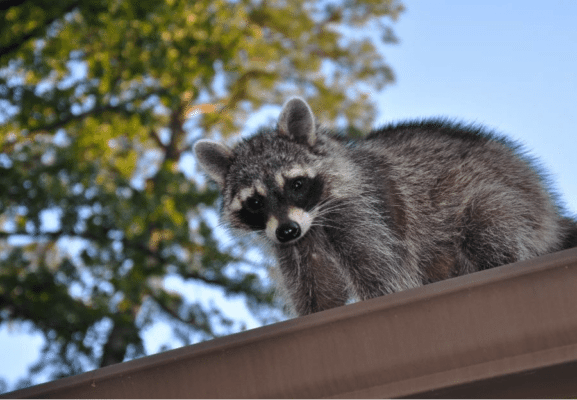
Are skunks settling in as your new neighbors? Are you hearing scurrying in the attic? As the weather gets frosty in Bridgton, Maine, the local riff-raff moves in and suddenly you have a wildlife control problem on your hands. Yet a single skunk or squirrel isn’t indicative of a real problem, so how do you know when the wildlife population has spiraled wildly out of control in and around your home? Check out these warning signs, and call Modern Pest to solve it in a few simple steps.
Do I Have a Skunk Problem?
Many folks in Bridgton experience the pungent odor of a skunk’s spray, but a lot of us only deal with this from a distance. When the family dog comes in from the yard reeking, though, it’s time to look for other telltale signs.
- One of those signs is little holes throughout your yard.
Skunks eat a lot of bugs, and one of their favorites is the Japanese beetle larvae that lives in the ground. They also chow down on slugs, grubs and snails – all pests that can be a detriment to your lawn. So despite the holes, they’re doing you a favor. Yet when you pass by them unknowingly and scare them into spraying, it’s hard to be appreciative.
- Another sign is a persistent smell in your yard that just won’t go away.
Skunk spray is an oil, and can sit on your lawn for a long time. If it’s a smell that doesn’t subside, you need to remove the culprits.
We don’t recommend handling their removal yourself for many reasons. If you take the parents and accidentally leave the young ones, they’ll stick with what they know – which is your yard. Calling a wildlife control expert will not only ensure you round them all up, but that you don’t get stink-bombed in the process.
Are Those Squirrels or Raccoons in My Attic?
Most homeowners are all too familiar with the damage done by rodents in the attic. Destruction to electrical wiring and parts of your house, not to mention the smell, can result in costly repairs. It may not matter to you whether it’s a squirrel or raccoon – either way it needs to get out. But being able to inform squirrel control experts what size trap they need is very helpful. Here are some pointers:
- Both will cause noises in the house, like scurrying, thumps and bumps. Raccoons are active at night, and squirrels by day – unless it’s a flying squirrel.
- Both will leave droppings, though squirrels will naturally be smaller.
- Large holes or damage to the fascia will suggest raccoons, while chewing to shingles and outer panels with much smaller holes suggest squirrels.
- Loud scratching or scuttling in the walls may indicate squirrels. They are small enough to fall in between your walls from the attic.
- Squirrels will damage your outdoor furniture, while raccoons will be more likely to tackle covered trashcans.
- Raccoon footprints may be slightly larger and they put more pressure on their heels, resulting in a deeper imprint. Squirrels are much more light-footed, and leave distinct nail marks.
What if it’s Bats?
While bat droppings are pretty similar to squirrels’, there are a number of ways to tell whether or not bats have taken up residence in your home.
- The most obvious is if you find them sleeping during the day in your chimney or if you brave the attic.
- While you’re up there, check for bat guano. Although it looks like other rodents’ feces, it definitely doesn’t smell like it. You’ll get hit with an ammonia-like smell if the culprit is a bat.
- Less obvious is a distinct scratching noise that comes not from your walls (where squirrels might’ve fallen) but from your attic. It will happen most often at night.
- Another trick is to sit outside your home right around dusk and see if any bats appear in the sky near your roof. This will almost certainly tell you that they have decided to room with you, though it may require a few diligent evenings on watch.
Modern Pest Wildlife Control Division
Modern Pest has an entire division dedicated just to wildlife control, that’s in full compliance with all local and state laws. Our certified squirrel and other wildlife control experts know exactly what to do to discover the type of pest, design a trapping and removal plan, and even fix the damage and seal the holes to prevent future infestations. For more information on how Modern Pest’s Wildlife Division works, check out our blog and then schedule a visit with a wildlife control expert!
